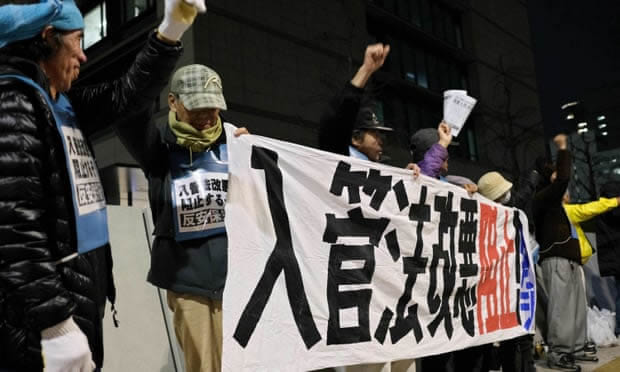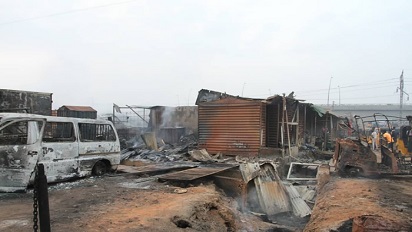Fears of exploitation as Japan prepares to admit foreign workers

Tokyo recruiting estimated 345,000 to address labour shortage, but critics warn not enough is being done to prevent abuse Two years ago, Pisey Eng left her young son in the care of her mother-in-law and came to Japan to start a job she was told would pay her a decent wage and teach her skills that would serve her well back home in Cambodia.
Despite having been told she would receive 120,000 yen ($1,100) a month – a far bigger salary than she could have expected
in Cambodia – Eng, 33, found herself working punishing hours ironing and packing in a garment factory for just half of what she was promised.
Months after fleeing her workplace in despair, she is jobless, homeless and unable to afford the airfare home.
“I started work at 8.30am and sometimes I continued working until one, two or three o’clock in the morning,” said Eng, who was part of the Japanese government’s technical intern training programme, a scheme launched in 1993 to offer on-the- job training to young men and women from developing countries. “I didn’t have any holidays; I became ill and had no appetite.”
The expected arrival of large numbers of foreign, blue-collar workers in Japan over the coming five years has raised fears of a sharp rise in incidences of exploitation of the kind experienced by Eng.
In December, the country’s parliament passed legislation that will soon open the door to an estimated 345,000 thousand foreign workers, in what is being called the end of Japan’s traditional opposition to large-scale immigration.
The world’s third-biggest economy is battling its tightest labour shortage in decades due to its low birthrate and rapidly ageing society. Unemployment is at its lowest level since the early 1990s, and last year job availability rose to its highest in 44 years, with 150 jobs open to every 100 people seeking work.
Critics say the government has not done enough to prevent employers from using the change to secure cheap labour, amid evidence that many pay existing foreign workers below the going rate and force them to work long hours.
“There is a risk that the same abuse will be repeated with the new intake from next year, so there must be an acknowledgement that the existing programme has been a failure,” said Shoichi Ibusuki, a lawyer who helps abused foreign workers. “It’s vitally important to stamp out human rights violations.”
A labour ministry investigation found that of the 6,000 firms that hire a total of 260,000 technical trainees, about 70% had broken labour regulations on illegal and unpaid overtime.
Last year, more than 7,000 interns fled from their workplaces, with most citing low wages and long hours. Others were physically abused, while in some cases pregnant trainees were forced to choose between having an abortion or leaving their job, according to the Asahi Shimbun newspaper.
Soon after parliament approved the immigration change, the justice ministry revealed that 174 technical trainees, mostly people in their 20s and 30s from China, Vietnam and Indonesia, had died between 2010 and 2017. The majority had died in workplace accents, while 13 had committed suicide. Others had suffered heart attacks and strokes, both of which are associated with karoshi, or death from overwork.
In December the Japanese government approved measures it claimed would prevent the abuse suffered by existing technical trainees. It pledged to offer “proper” working conditions to new workers, including fair pay and hours, adding that it would cooperate with other countries to prevent brokers from collecting fees from workers before they arrive in Japan.

Eng’s hourly overtime rate of 300 yen to 500 yen ($2.70-$4.50) was far lower than the 800 yen minimum wage in Gifu, the central Japanese prefecture where her workplace was located. “I couldn’t take any holidays, even when my Japanese coworkers were taking them,” she said.
Her plight has been worsened by the $4,000 debt she has to repay to the Cambodian company that brokered her placement in Japan, while her former employer in Japan told labour inspection officials that she had lied about her poor working conditions.
According to Ibusuki, many trainees are deeply indebted to brokers in their home countries before they even set foot in Japan. “Once they’re here they are reluctant to speak out and continue to work in illegal conditions because they know they have to pay back the original sum,” he said.
Eng, who now lives in a shelter with 15 other foreign trainees, is counting the days until she can be reunited with her eight-year-old son in Cambodia. “I feel very sad, because I have no work and no money, all because of the problems I had with my employer,” she said. “Now I just want to go home and take care of my son.”
Read Also:
My wife asked me to die and be buried
Saraki blasts APC after Buhari was booed at N/Ass
Man secretly buried after being killed by igilante members in Delta
Ex-Air Chief Marshal Alex Badeh aides killed in Abuja
Muslim woman decorates Pastor house ahead of Christmas in-Kaduna










